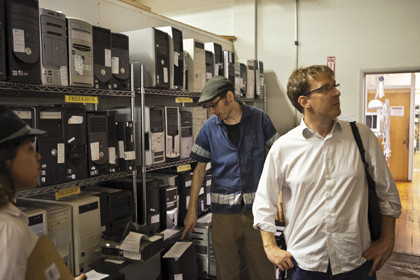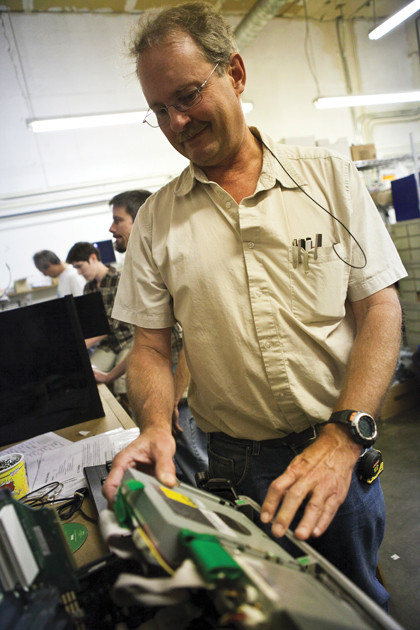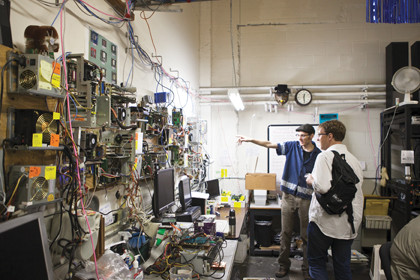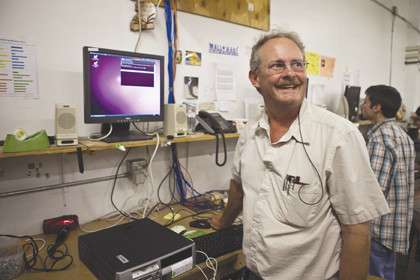The ultimate recyclers: making new PCs from old
Inside the Free Geek non-profit hardware emporium
The amount of hardware taken in by Free Geek in total is staggering, as this breakdown shows:
17,889 Laptops
1,209 Laptop Macs
588 Servers
121,562 System
1,641 System Macs
1,029 System w/CRT
1,372 System w/CRT Macs
557 System w/LCD
425 System w/LCD Mac
94,557 CRT Monitors
9,306 LCD Monitors
But there's a limit to how old these devices can be, and Free Geek has found it can be relatively choosy when it comes to the age of the hardware it uses in its rebuilds. Their new machines are normally the equivalent of the latest hardware from just a few years ago.
Anything too old to use is marked for recycling – a part of the process handled by an external firm; and if it's too difficult to recycle, it's culled.
Linux compatibility is also an essential part of the equation. The final hardware will have Ubuntu installed as its operating system, and it needs to work 100% with the networking, audio and video. For that reason, esoteric stuff gets put aside or sold in the thrift store, while the items the team is certain will work on Linux are passed forward to the testing lab.
As a result, the volunteers working in this section quickly become adept at finding product numbers on the side of chips, knowing which derivatives will work without modification and which won't. These are essential skills for a job in IT, as well as teaching you a great deal about the nature of hardware.
Testing, testing

If the incoming hardware survives the first round of quality checks it then needs to successfully navigate through the testing labs. These ensure that any hardware passed on to new machines is fit for purpose.
Sign up for breaking news, reviews, opinion, top tech deals, and more.
The most important part of this process deals with data. Free Geek takes data disposal very seriously. If drives are going to be re-used, they recommend using Darik's Boot And Nuke (better known as DBAN) on your drives before taking them into the shop. They even offer free bootable discs with software you can take away and run at home. But they also do this write-rewrite process themselves, as part of the hardware testing.

When you walk around, you can't help but notice the DIY rig they've built for running this software themselves. Large arrays of drives are connected to open motherboards sitting on shelves, with clusters of caddies hanging in every direction. Each drive is being tested and erased at the same time so that the group can be certain they are both reliable and completely clear of previous data.
If a drive doesn't pass the test, Free Geek has its own unique way of destroying the platters – a drill placed on the side of the desk that physically destroys the disk, making it virtually impossible for anyone to retrieve anything from the drive.
Screens use a similar array of connectors for testing. Two shelves feature a multiplex of DVI and VGA cables, all carrying a test signal, and these are connected to the screens, and even projectors, Free Geek takes in. Adequate time is given for each to prove their worth before they're passed on to the construction line.

But the most impressive configuration is reserved for memory, CPUs, power supplies and graphics cards – a section for PC triage, dubbed Advanced Testing. Here, motherboards are bolted vertically into a wall, complete with all their connected hardware humming away, and they're left to run a custom test suite of tools for hours until they've been given the OK. This room is hot and noisy, especially in the middle of Portland's summer, but this is an essential part of the process. If the kit being put into a new machine isn't as good as new, it will create more problems than it solves.
The end result is probably a more stable machine, with greater longevity, than an off-the-shelf solution from any PC store, thanks to this degree of testing.
Perhaps surprisingly, there's also a lot the team can do with donated laptops. Like their desktop counterparts, many can be pulled apart and upgraded. But it isn't easy, and it requires special skills and further training. As a result, the laptop rebuild section is occupied by the best volunteers from the desktop section, as they can quickly get to grips with the various form factors and configurations without doing too much damage.
Machines are then upgraded as their specification allows, extending the life of what is usually fixed hardware and making some money for Free Geek in the process.
One growing exception is Mac laptops, as well as many of Apple's integrated desktop machines. Apple's increasing obsession with miniaturisation makes these devices incredibly difficult to upgrade, and while storage and memory can be replaced, and the devices sold without an operating system, there's very little else Free Geek can do to extend their life.
As Free Geek told us, they're continually keeping track of trends so that they can best adapt to the new skills the latest hardware requires, "Evaluating the next tech area to build our programs on is an ongoing process. Very often, a volunteer with the requisite skills will propose an area – that's how we started working with Macs. We're hoping to find ways to address tablets and other small devices in the coming year."
Software

After the machines have been built and tested again, the final step is to install something onto the hardware, and this is where Linux comes in. Free Geek installs the same operating system onto all of its machines because it's obviously much easier to manage and maintain.
When we visited, their operating system of choice was Ubuntu 10.10, as this gave people a familiar desktop environment alongside a massive choice of applications that could be easily installed through the package manager.
We asked whether they were considering switching to a Unity-based desktop, but they said it was too early to predict. They wanted to run some real usability tests on the desktop to see whether people would feel comfortable with the change, and that was something that would take time. The plan was to put people in front of the new desktop to check whether the new environment may confuse a user base who are mostly looking for a way of transferring their Windows skills to a new machine. We don't know what the answer might be, but we asked Free Geek to let us know the results.
As for whether people stick with Linux, a significant number seem to: "From what we can tell, about 40% of the people who get our computers continue to use Linux," Free Geek told us. "There is always some pushback from people who are used to Windows; we offer classes on using Windows programs in a Linux world, but there is room for growth in the area of making converts and keeping them."
This just goes to show that, when given Linux without prejudice, a lot of people find it's perfect for their needs. And if people are worried about how difficult it might be, there's always the training. There's a room set aside to get people up to speed with the Linux environment, as well as specific sessions that deal with software, such as The Gimp or LibreOffce. This gives the new owners the best possible chance of feeling confident with their new hardware and, hopefully, sticking with Linux.
It certainly helps when it comes to technical support, as the small team who deal with callers are using Linux too. They even take calls from people not directly involved in Free Geek.
The future
The Free Geek movement has spread from Portland (aka the Mothership), in a collective the wiki calls Free Geek Intergalactic, and they can now be found in Arkansas, Chicago, Columbus, Michiana, Providence, SoCal, Toronto, Twin Cities and Vancouver.
But each is run more or less independently, "We have limited involvement with other Free Geeks, mainly due to lack of capacity. We ensure that anyone using the Free Geek name is following our standards for recycling, open source, and consensus decision-making.
"We hope to expand our involvement with other Free Geeks in the future, but this is dependent on staff time, as always."
PC hardware now lasts longer than ever before, and thanks to the downturn in the economy, initiatives such as Free Geek are a fantastic way of not only recycling old equipment, but also giving people new skills and confidence, helping Linux adoption along the way.
We can't think of a better combination, and we wish Free Geek all the best for the next 11 years.
--------------------------------------------------------------------------------------------------
First published in Linux Format Issue 153
Liked this? Then check out 7 genius gadgets made from recycled materials
Sign up for TechRadar's free Week in Tech newsletter
Get the top stories of the week, plus the most popular reviews delivered straight to your inbox. Sign up at http://www.techradar.com/register
Follow TechRadar on Twitter * Find us on Facebook * Add us on Google+
- 1
- 2
Current page: We are Free Geek: recycling in numbers
Prev Page We are Free Geek: ultimate PC recyclers